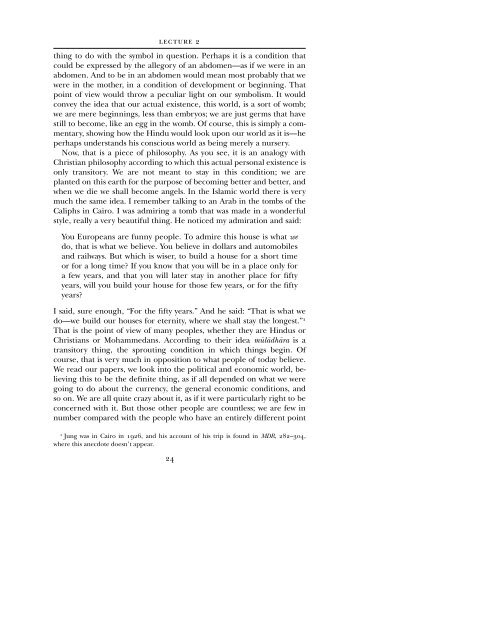CG JUNG - Countryside Anarchist
CG JUNG - Countryside Anarchist
CG JUNG - Countryside Anarchist
Create successful ePaper yourself
Turn your PDF publications into a flip-book with our unique Google optimized e-Paper software.
LECTURE 2<br />
thing to do with the symbol in question. Perhaps it is a condition that<br />
could be expressed by the allegory of an abdomen—as if we were in an<br />
abdomen. And to be in an abdomen would mean most probably that we<br />
were in the mother, in a condition of development or beginning. That<br />
point of view would throw a peculiar light on our symbolism. It would<br />
convey the idea that our actual existence, this world, is a sort of womb;<br />
we are mere beginnings, less than embryos; we are just germs that have<br />
still to become, like an egg in the womb. Of course, this is simply a commentary,<br />
showing how the Hindu would look upon our world as it is—he<br />
perhaps understands his conscious world as being merely a nursery.<br />
Now, that is a piece of philosophy. As you see, it is an analogy with<br />
Christian philosophy according to which this actual personal existence is<br />
only transitory. We are not meant to stay in this condition; we are<br />
planted on this earth for the purpose of becoming better and better, and<br />
when we die we shall become angels. In the Islamic world there is very<br />
much the same idea. I remember talking to an Arab in the tombs of the<br />
Caliphs in Cairo. I was admiring a tomb that was made in a wonderful<br />
style, really a very beautiful thing. He noticed my admiration and said:<br />
You Europeans are funny people. To admire this house is what we<br />
do, that is what we believe. You believe in dollars and automobiles<br />
and railways. But which is wiser, to build a house for a short time<br />
or for a long time? If you know that you will be in a place only for<br />
a few years, and that you will later stay in another place for fifty<br />
years, will you build your house for those few years, or for the fifty<br />
years?<br />
I said, sure enough, “For the fifty years.” And he said: “That is what we<br />
do—we build our houses for eternity, where we shall stay the longest.” 1<br />
That is the point of view of many peoples, whether they are Hindus or<br />
Christians or Mohammedans. According to their idea mÖlvdhvra is a<br />
transitory thing, the sprouting condition in which things begin. Of<br />
course, that is very much in opposition to what people of today believe.<br />
We read our papers, we look into the political and economic world, believing<br />
this to be the definite thing, as if all depended on what we were<br />
going to do about the currency, the general economic conditions, and<br />
so on. We are all quite crazy about it, as if it were particularly right to be<br />
concerned with it. But those other people are countless; we are few in<br />
number compared with the people who have an entirely different point<br />
1 Jung was in Cairo in 1926, and his account of his trip is found in MDR, 282–304,<br />
where this anecdote doesn’t appear.<br />
24


